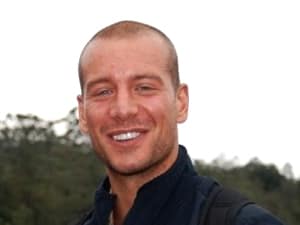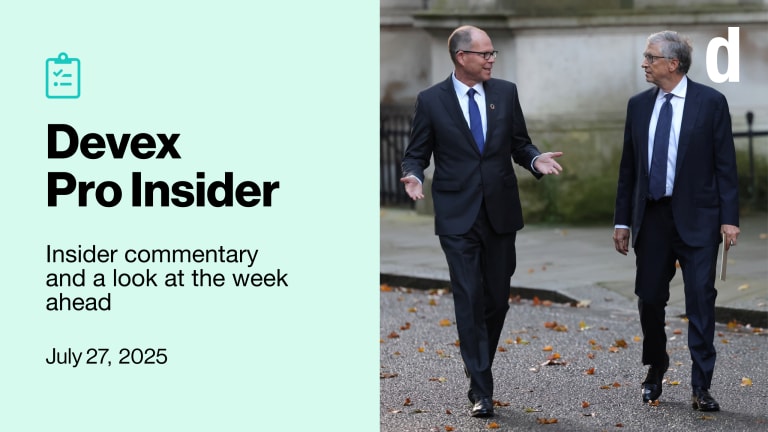
Justin Vero is a health and fitness enthusiast; he runs and performs daily workouts. How, then, will he cope when he has only $1.50 to spend daily over five days for food and drinks?
Vero is the founder of The Global One Foundation, which uses an integral approach to community development by promoting volunteer service. He is joining thousands of people around the globe who will Live Below the Line from April 28 to May 2. The global initiative aims to raise awareness and funds toward the plight of the 1.2 billion people living in extreme poverty.
While Vero said the challenge is one that he’s more than happy to take, he does wonder how it will affect his energy and clarity.
“Thinking here of all that spinach I just planted and how it will be gone by the first day! But I like it because I'll be forced into more simplicity all around and I'm trying to see it as fine-tuning what is still excessive in my consumption habits,” he said, noting that he’ll consult the Live Below the Line cookbook for how to manage his diet during those five days.
Ahead of the Live Below the Line challenge, we spoke with Vero about the benefits of joining the initiative.
What do you think the supporters of Global One will take away from Live Below the Line?
This is really a campaign based in empathic attunement. It’s saying eat in my kitchen for a week which the majority we support don't even have. This gives people that taste of empathy with a third of the population on our planet without even leaving their homes.
And that's a really smart approach I think because it allows people to live their lives but live them within a global context. It's a counterforce to our collective conditioning of "out of sight, out of mind" into, “no wait a minute, out of sight is a call to bring to mind!" Like all growth and change, it requires a new momentum, a new paradigm. And the best way to change a paradigm has always been through exposure.
Eating and drinking on $1.50 a day, although only a small taste of truly experiencing extreme poverty, I think it has the opportunity to create a profound shift in awareness.
I think there will be many people participating from developed countries who will start to feel some profound compassion and empathic resonance especially when its day two or three, and it’s really challenging. You're looking at your present life, with everything that comes up around that and if you're a mother or father, for instance, you'll surely start to think about how it would be if you lived this way as many other parents do with so many children go without eating for several days, or how you would probably consider sacrificing what you eat just so your child has enough. Even nonparents; the simple awareness the campaign can offer really escapes no one in that it puts up the constant mirror on choices and privileges.
I also think it will help people see what is really enough and what it means to really live simply when we are conditioned to be consumers from our birth. Hopefully, it will show one the real consequences of needless consumption not just materially but also how reduction can lead to more awareness. It’s purifying. When something is no longer intellectual or on the Web, it's experiential. And this is what changes behavior. Hopefully this will lead to people making changes in their daily life — maybe even to grow some of their own food, cut down on energy costs, invest in solar panels or support these organizations who support families in extreme poverty.
What is Global One's goal in trying to raise awareness and funds through the campaign?
We look to use the most sustainable approaches and to create the most human well-being and flourishing as we can. Our model is based in systems thinking, which was developed into our integral aid focus in Kibera, Kenya. The cornerstone is education given that education is the underpinning to a creative, thriving and self-directed life in our postmodern times.
In Kibera, we are providing education to those children without financial ability or who are orphaned such as the Global One Kibera School, which supports more than 300 children and 150 orphans with an integral education and nourishment, and the Global One Computer Center of Kibera, the first-ever computer learning center in Kibera which is open to the community. It is a community with a 2 percent computer literacy rate and who are really going after these skills because there just aren't the resources to buy computers.
So our goal with the funds raised is to expand our education program through building another school that can accommodate another 300-plus children and to expand our computer center outreach. We want to provide thriving structures for as many lives as we can.
Our broader goal is one of human values: We want to get people closer to emphatic attunement. When almost half the population on Earth (nearly 3 billion) is living on less than $3 a day and a third of our world is living on less than $1.50 a day in a context of abundance of wealth and technology that is present, it's perhaps the greatest form of violence that has ever faced humanity.
Live Below the Line is a campaign that brings together many organizations working to end extreme poverty. What do you see as the benefits of this type of collaboration?
Great question. I see collaboration as the new genesis of seeing and creating what is possible. Competition in its normative frame is really so outdated and for the most part harmful when it comes to human well-being. It’s part of the reason why we have this problem to begin with.
But this collaborative take that Live Below the Line has really models this emergent trend. By putting it into practice amidst the challenges in our economic paradigm to compete for funding and resources, it really breaks all of these barriers by showcasing all of the work toward one central unifying purpose. Your frame on something is everything. And that's how you unite anything, by giving a broader purpose or boundary line. This is a collective cause in which an organization's purpose becomes a placeholder for individuals across the world to be change agents directly themselves. It’s fantastic.
The broader goal is to end extreme poverty here and bring well-being. Equalizing and establishing a cooperative paradigm to promote global human flourishing is how it starts. It's rethinking it as competing for cooperation, much more wholesome and promotes far more goodness and beauty in this world. Isn't that what we want?
The Global One Foundation is a partner organization of the Live Below the Line campaign, a five-day challenge to eat and drink using only $1.50 per day to raise awareness and funds toward the fight against extreme poverty. Click here to sign up for the challenge.








